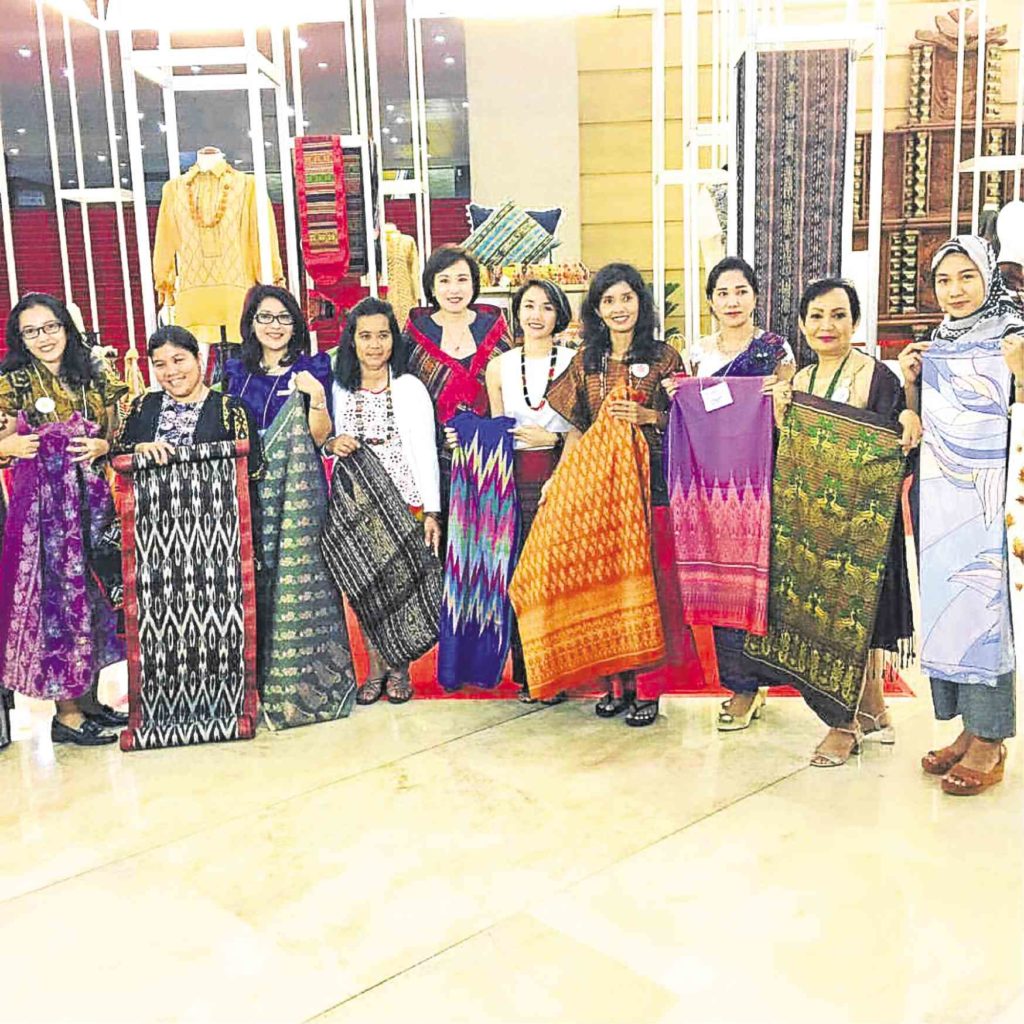
Women entrepreneurs display their textiles.
The Philippines’ “great women” are taking on Southeast Asia.
After the four-day Asean Women’s Business Conference held in August, the country’s Great Women (GW) Project, which started out as a public-private partnership program to help small and micro enterprises led by women go up the market value chain, is now making waves across Asean’s other nine member-countries.
It’s all thanks to two women who have been tirelessly working on the project since it started five years ago: Jeannie Javelosa and Chit Juan of the Echosi Foundation, the program’s private sector partner.
“With support of the development initiatives, we who lead GW, along with other Asean women entrepreneurs, figured [the program], is the easiest way to integrate women-owned enterprises. We are able to sell to each other and sell across borders,” says Javelosa.
Inspired by GW’s inclusive business model, other Asean member countries are now replicating the platform according to the needs of women in their respective homelands.
Myanmar’s Ma Khine Zaw, CEO of Earth Group of Trading, is putting up a GW Showroom and Cafe—like the one on A. Arnaiz Avenue in Makati City—in Yangon, with help of the country’s Social Ministry.
The Earth Group is the same company which brought clothing brand Penshoppe to Myanmar.
The recent GW trade showcase, which was held alongside the Asean Women’s Business Conference, also showed the strong potential of the region’s coffee and tea industries for the platform.
launch of the Women Beyond Borders.
“For coffee, we are able to trade with each other to make Asean blends—coffee from Laos and Philippines will be sold in state-of-the-art coffee capsules labelled IWCA (International Women’s Coffee Alliance) by Sinouk Coffee’s Serina Hervy-Sisombat of Vientiane and Pakse, Laos, the Woman Entrepreneur Awardee at the Asean Business Awards held in September,” says Juan.
“Also, from Myanmar, Sithar Coffee’s Au Phuo Ang has packaged coffee from Maymyo and Pyin oo Lwin coffee regions [under] GW, which are now being sold in the GW Cafe and Showroom in Makati City,” she adds.
Not to be outdone, Cambodia brought its world-famous Kampot Pepper to the GW Cafe and Showroom through entrepreneurs Nanda Pok and Chenda Clais, along with other textile products.
The pair will also be leading GW tours to elephant conservation sites, coffee farms and pepper plantations in Cambodia, says Juan.
Javelosa, who is focused on bringing Philippine textiles to the international stage, says GW is already taking orders for business-to-business transactions of these products.
“We have also begun groundwork for collaboration with women groups in Singapore for the GW in Asean Forum in 2018, as they will be hosting next year,” she adds.
As Javelosa and Juan work on building up GW’s “enterprise side” across Southeast Asia, the program’s development work continues here in the Philippines.
Funded by the Canadian government until 2020, GW is now on its second phase here in the country, part of which was the establishment of the cafe and showroom.
The program’s government partner, the Philippine Commission on Women (PCW), is working with other nongovernment organizations for this phase, such as Bayan Academy for Social Entrepreneurship and Human Resources Development (Bayan Academy) and microfinance, social entrepreneurship and financial literacy capacity builder Social Enterprise Development Partnerships, Inc. (Sedpi).
PCW initially tapped Echosi Foundation as its sole private-sector partner for the first few years because of the group’s expertise in product development and design, as well as providing market access to women microentrepreneurs who had good products to sell but lacked marketing skills and knowledge.
“Echosi Foundation is now [the project’s] lead for value addition and market access,” says Javelosa. “Now we will dive deeper into Western Visayas textiles, such as the patadyong weave in Panay, Iloilo.”
Currently under the GW brand are beadwork and textile creations of the Bagobo-Tagabawa and T’boli tribes.
Getting these products and the entrepreneurs behind them to the Asean market, however, is the ultimate goal for Javelosa and Juan.
Javelosa says talks are under way with the Canadian government for funding of GW’s full replication in the nine other Asean member-countries.
“If you look at the program, we’re already [working] at the top level when it comes to the market value chain. So it’s all about bringing the small people up,” Javelosa says.

